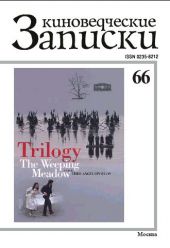 |
 |
PERSONALIA Natalia SAMUTINA. Theo Angelopoulos: past, memory, sources. Supplement «I would like world to remember me as a musical phrase…» Theo ANGELOPOULOS about his films. When we speak on Angelopoulos as well as any other Greek artist we inescapably begin with a phrase about a very complicated situation is culture in modern Greece. Myths, wars, homelessness of souls — and old stones, statues, old earth. Does the poet create his gloomy world in spite of this load or thanks to it? IN THE REALM OF CULTURE Sergei TRYMBACH. Surreality in the Ukranian cinema (evolution of mythological poetic creation). There were no surrealism in the Sovit Union: it was prohibited. But of course there were some traits. The film explorer reflects on national features of Ukraine culture (and cinema in particular) and finds influences and presentiments in Paradganov’s and Ilyenko’s films as well as in Gogol’s and Shevchenko’s books. COLLOQUE Evgenii MARGOLIT. Miracle of norm, or A voice-over. Nicolai RASHEEV: «There is always farce in life, or I believe in a miracle». (Interview by Natalia Mazur). Nicolai RASHEEV. BOGODUKH. Filmscript. Nicolai Rasheev could be one of the most popular directors. His «Bumbarash» was an incredible success for its humor, feeling of independence and of course for its soundtrack. But most of others where forbidden, «put on a shelf» or even were prosecuted. We hope that his new screenplay, published in this issue, will have another destiny. EXPERIENCE Victor FILIMONOV. Discharge of debt, or Origine of the genre (Towards the phenomenology of scriptwriting). Characters by Evgenii Grigoryev, screenwriter of «A Romance Lover’s» and «Three days of Victor Chernyshev», became a kind of patterns for the generation of the 70-ies. He was one of those who remember the war, but couldn’t take a part in it, because were too young. The author of the essay tries to explore the development of Grigoriev’s hero and his relations with generation of fathers, the attempt to return the debt. REPUBLICATION Evgenii MARGOLIT. Soviet film art. The main stages of formation and development. (Brief studies in the history of feature cinema). The unique attempt of one of the most interesting modern Russian cinema explorers to describe complex process in several chapters. It was published in 1989 as a student’s book so it was never known widely, but because of its original point of view and integrity became a rarity. RUSSIAN EMIGRATION AND CINEMA Rashit YANGIROV. «Mastering the gift of Speech». A «Russian accent» in French cinema’s at the Early Sound Period, 1929–1932. (The ending). Supplement Emigrant press on «Don Quichotte». Abel Gance collaborates with Eisenstein, Fyodor Shalyapin wears Don Quichotte’s armour in Pabst’s film based on Merezhkovsky’s screenplay. It was a hard time for cinema (mastery of sound) and hard time for Russian йmigrйs. The continuation of publication from issue 65. RESEARCH Rimidalv NIDORBAZ. Three R’s. The article presents a fascinating archive investigation on three pseudonyms appearing in Soviet cinema press in the 1920-ies. Vera YURENEVA. «Is it possible that it really was so?» (Publication, introduction and comments by Alexandra Batalina). Memoirs of one of the most attractive actresses in pre-revolutionary Russia, «the woman of tomorrow’s day». Her reminiscences about theatre career were published repeatedly. Our publication deals with her cinema activities. By the way, Vera Yureneva was A.Voznesensky’s (Ilya Renz, one of R’s from the previous publication) wife. Supplement Ilya RENZ. «Theatricals» in cinema. In the essay Voznesensky reflects on cinema works of well-known theatre actors of those times. To his opinion, camera needs special abilities and technique. A TOPIC FOR RESEARCH Ada BERNATONITE. Myth as a form of world’s existence. Myth is an essential part of human consciousness, it is a heart of cinema thinking. Myth is the space where a person exists. Pazolini revises two of them. Author maintains, that sources of italian’s drama and esthetics one must search for in this two ancient plots. Lidia KUZMINA. Towards history of Dogme 95: retro with claims to New Wave. Quite enough time have passed since Trier’s manifesto was published. Now Dogme 95 becomes a part of film history and somebody can come to carefully thought out conclusions. The author compares the declared ideology of the project with the films produced by Dogme’s members. Returning to published materials Our authors |
|
 |
||||||||||||||||||||||||||||||||||||||||||||||||||||||||||||||||||||||||||||||||||||||||||||||||||||||||||||||||||||||
| « | » |
является незаконным.



